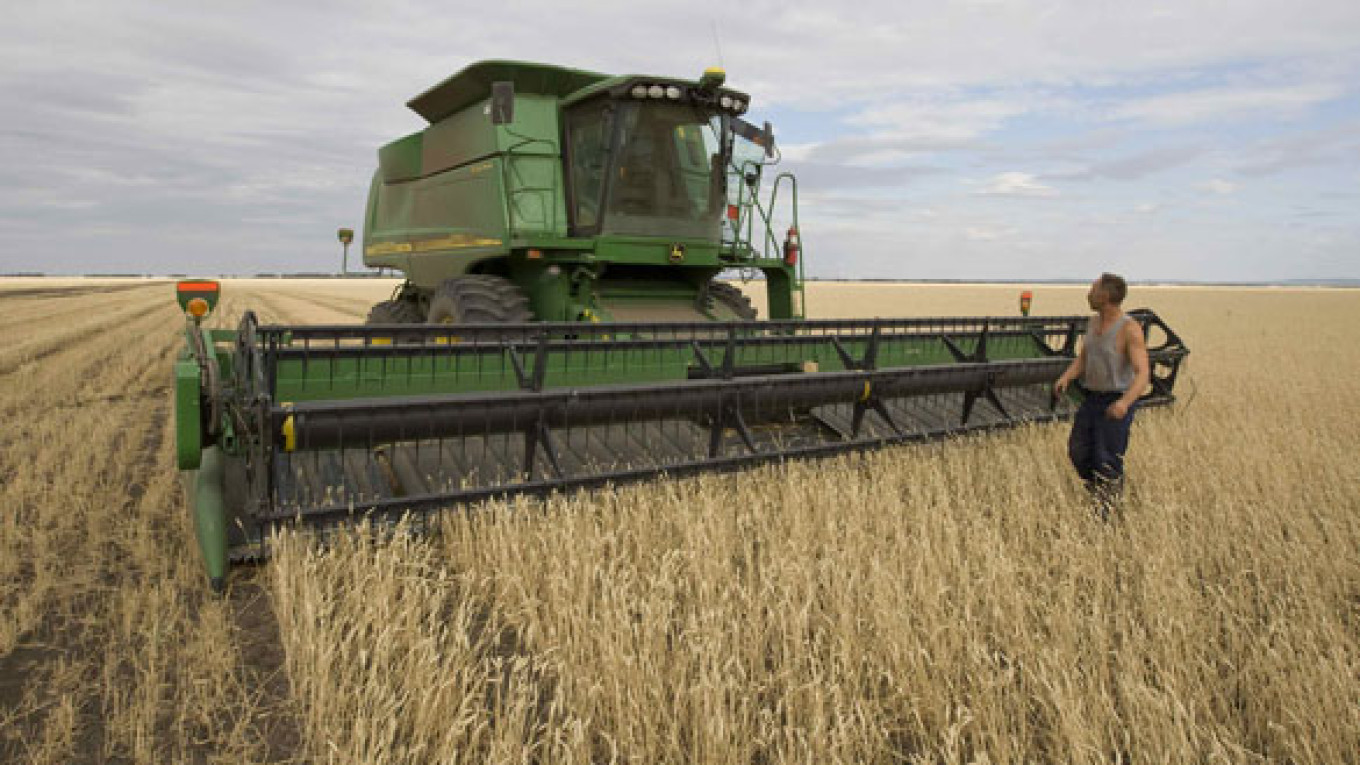Prime Minister Vladimir Putin on Thursday abruptly extended the grain export ban by at least several months from the end of this year because farmers and wholesalers sent grain prices up by holding the latest harvest.
Putin's decision, made at a regular session of the Presidium, the downsized Cabinet, threatens to further undermine Russia's hard-won status as the world's third-largest grain exporter. But Putin appeared intent on stabilizing the domestic grain market, still reeling from the worst drought in decades despite an export embargo from Aug. 15.
"We are seeing that grain is being held in anticipation of the next steps," Putin said, adding that the government would not consider removing the export ban until after the collection of next year's harvest. "We can't allow any back and forth here."
Farmers normally end harvesting late grain crops in October, meaning that the export ban might be in place until next fall.
Putin said the measure was an effort to remove "unnecessary nervousness" and prompt grain business players to "target the demands of the domestic market."
No government officials had previously signaled that there might be such a long wait to lift the export ban. Putin's statement, however, is hardly a surprise for the global market because it anticipated the decision on the news of the poor grain harvest in Russia, said Andrei Sizov Jr., managing director at SovEcon, a market research agency.
Wheat futures were trading up 1.2 percent in Chicago.
Despite October being the time when harvesting comes to a close, Putin might have meant that the ban would be lifted before that, Sizov said.
"I think he might have been talking about the middle of next year when harvesting starts and it's already clear what the new crops will look like," he said by telephone.
Some suppliers may indeed be holding their grain because they are counting on higher prices in the future, but some farmers have gradually resumed deliveries after the export ban came into effect Aug. 15, Sizov said. Grain prices may, however, grow significantly by next summer as reserves deplete, he said.
Prices for some sorts of grain, including milling wheat, have decreased over the past two weeks, while prices for feed grain have soared, he added.
Putin's warning was so abrupt that the Agriculture Ministry conceded Thursday that it had been unaware of any extension for the export ban.
Agriculture Minister Yelena Skrynnik said the country would need another bumper crop next year to stabilize the situation. Farmers would need to collect 85 to 90 million metric tons of grain next year, she told President Dmitry Medvedev at a meeting in Saratov.
"We believe we can fulfill this task," she said at the meeting of the advisory State Council.
A total of 48 million hectares of land will be sown with grain in the next season, which will produce 80 million tons in next year's harvest, she said. She didn't say where Russia would get more grain to meet her own target.
This year's harvest is expected to come in at just 60 million to 65 million tons as a result of a weeks-long heat wave.
Medvedev reiterated the government stance that the harvest would be sufficient to meet the domestic demand of up to 77 million tons, taking into account last year's carry-over stocks of 21 million to 25 million tons.
Last year, Russia harvested a record 97 million tons.
Medvedev said Russia would try to become a leading global exporter of grain once again.
"In recent years, we returned Russia to the status of a leading world exporter of grain, and we shall move forward despite all the obstacles," he said, according to a transcript on the Kremlin's web site. "Despite the unusual heat and despite the drought, our country has enough reserves of grain."
A Message from The Moscow Times:
Dear readers,
We are facing unprecedented challenges. Russia's Prosecutor General's Office has designated The Moscow Times as an "undesirable" organization, criminalizing our work and putting our staff at risk of prosecution. This follows our earlier unjust labeling as a "foreign agent."
These actions are direct attempts to silence independent journalism in Russia. The authorities claim our work "discredits the decisions of the Russian leadership." We see things differently: we strive to provide accurate, unbiased reporting on Russia.
We, the journalists of The Moscow Times, refuse to be silenced. But to continue our work, we need your help.
Your support, no matter how small, makes a world of difference. If you can, please support us monthly starting from just $2. It's quick to set up, and every contribution makes a significant impact.
By supporting The Moscow Times, you're defending open, independent journalism in the face of repression. Thank you for standing with us.
Remind me later.


